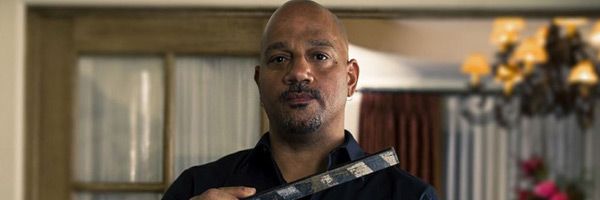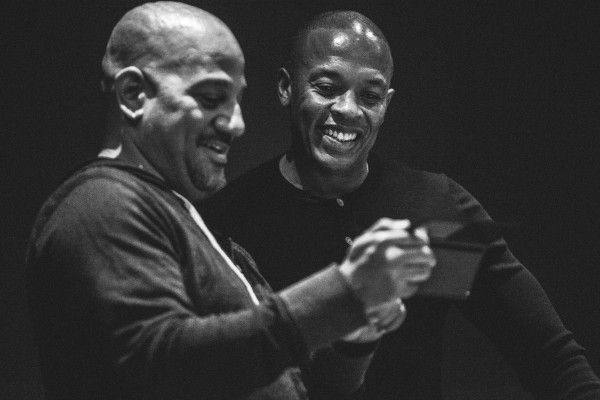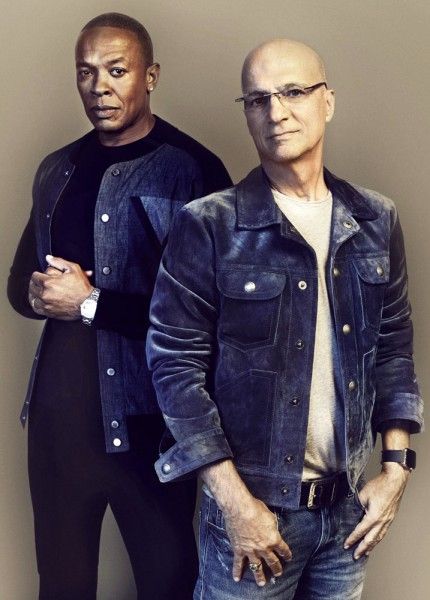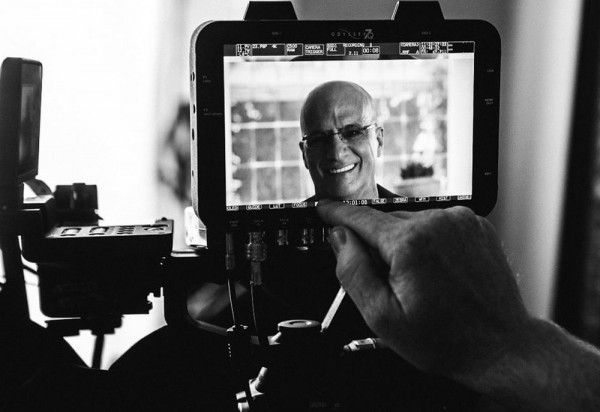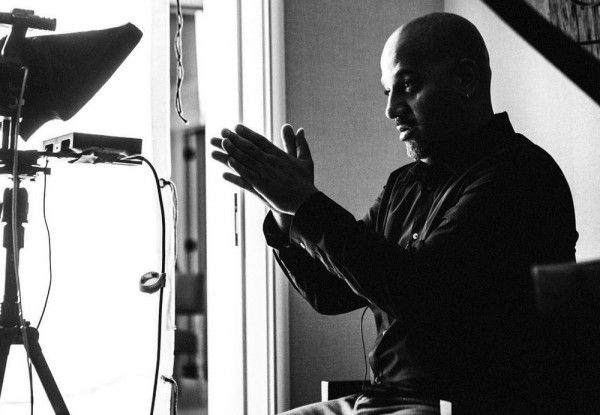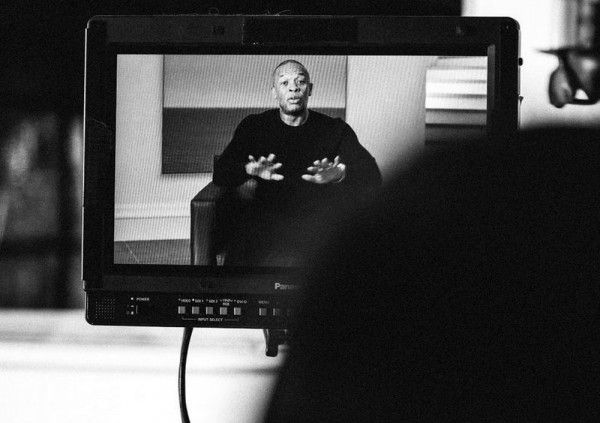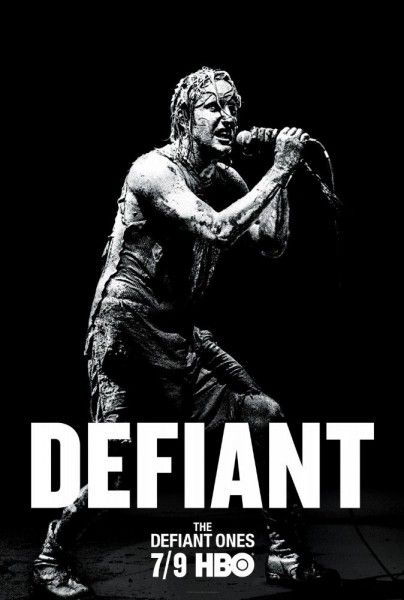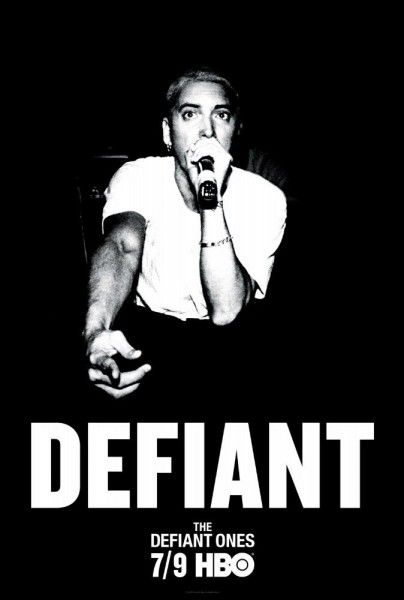From director Allen Hughes, the terrifically fascinating four-part HBO documentary The Defiant Ones is an in-depth exploration of the unlikely partnership between Dr. Dre and Jimmy Iovine. The unbreakable bond of trust and friendship these two men share has shaped many of the most exciting and extreme moments in recent pop culture, and through candid interviews with them, as well as a wide variety of music icons (including Snoop Dogg, Bruce Springsteen, Gwen Stefani, Bono, Eminem, Stevie Nicks, Ice Cube, Patti Smith, Lady Gaga, Tom Petty, Trent Reznor and Diddy), and never before seen footage from a multitude of recording and writing sessions, viewers will learn how they made their wildest dreams come true as they built their highly successful empires.
During this 1-on-1 phone interview with Collider, filmmaker Allen Hughes talked about how this documentary came about and evolved into what we see now, his filmmaking approach to the project, deciding on the right length for the doc and whether we might ever see any of the unused footage, how his appreciation for these two men has grown, getting the untold stories out there, and why the unlikely pairing of these two men has successfully endured. He also talked about the type of projects he’d like to focus on next.
Collider: How did this documentary come about? You’ve talked about how Dr. Dre mentioned doing something like this, in passing, but when did you get serious about doing it?
ALLEN HUGHES: About four years ago. Five or six years ago, we did that “I Need A Doctor” video together with Eminem. That was the first time I’d worked with Dre, even though I’d known him for over 25 years. So, I called the president of HBO one day and said, “What if I told you I could get the most enigmatic hip-hop artist of all time to open up about his life in a documentary?” They said, “Who?” I said, “Dr. Dre.” They said, “Green light!” I’d never heard a green light when I was in the room, in my life. And then, the president said, “We have one issue. We just agreed to make the Interscope documentary with Jimmy Iovine.” I said, “I’ll call you right back.” A lightbulb went off. I thought, “Oh, my god, that’s the story – the two of them.” I called Dre and he was with it right away, but it took some convincing with Jimmy. Jimmy had passed, for a whole year. We had a green light and he wouldn’t do it.
Did he give you a reason for why he wouldn’t do it?
HUGHES: He was like, “There’s just too much stuff. You want to go digging all that stuff up.” I knew which stuff, with Death Row and Time Warner. He just didn’t know if he wanted to get into it. He wasn’t ready, clearly. We had three crisis meetings and I was like, “This guy’s not ready. I’m outta here!”
Did you approach this project any differently than you would any directing project, or do you have the same approach to any film that you do?
HUGHES: In hindsight now, it’s surreal. I had an L.A. premiere and a New York premiere, and I did press, and I wasn’t even done with part four. Nothing was usual on this project. The only thing that was in common with my usual approach to film directing is that I just poured my heart into it. This time, it was more personal than I thought it was. I didn’t know how personal it was. There was no schedule and no script. The approach was just opening my heart and my mind up and trying to collect. I had to figure out how to decant these pop culture massive moments, open up multi-tracks and archival footage, and find iconic moments in music videos and show the moment before that moment. I had to get the raw takes of things. Even in the interviews, I made sure that no one knew the camera was on sometimes, and you see that awkwardness. They thought I cut or that the camera was off, and you saw the real person. I thought that was interesting. I was just trying to find a way to bring cinema to the documentary medium. I love documentaries, but most people feel like documentaries are like eating your vegetables because you’ve gotta learn something.
There are so many different and equally interesting layers to this documentary, from the backstories of these two men, to the desire to making something out of nothing, to the life and passion of an artist, to constantly evolving to stay relevant, to achieving dreams bigger than you could ever imagine. How did you figure out exactly what movie you wanted to make, and why was four parts the right length?
HUGHES: It could have easily been 10 parts. Jimmy and Dre didn’t have final cut or anything, but they were involved because they were giving me their lives. They didn’t want it to be over one part. They thought it comes off as too indulgent, but I told them that it was impossible. Me and my partner, Doug Pray, sat down and beat it out, and we knew it was actually five parts. It was a very difficult process. HBO, me, Jimmy and Dre, for a whole year, didn’t know how many parts it was.
So, do you get to a point where you just have to stop?
HUGHES: Yeah. My executive over at HBO, Nina Rosenstein, who’s a producer, is amazing. I’ve never had someone support me and fight for me within a studio or company like that. She just nursed it. It was supposed to take one year, but at the one year mark, I wasn’t even close to done. She was like, “Okay, Allen, we support you. This is amazing!” She kept going back and getting more money. I’ve never seen anyone operate like that. It was supposed to be a year, and it was well over three years. She was instrumental in putting my mind where I could even create something like this because you’re always creating under pressure and with people bitching and complaining. That was the opposite at HBO. HBO is not even artist friendly. They’re artist charged. They charge you and make you feel like you’re on steroids.
Will we ever get to see any of the footage that we don’t get to see in this? Would you ever put out more of it?
HUGHES: What’s interesting is that, in this day and age, if this thing does well, we can probably expand it. I’ve been really shocked at the reaction. I haven’t gotten this kind of reaction since my first film, and it’s maybe even a more nuanced reaction on this. But it would no time soon, though. This took everything out of me. This was the hardest thing I ever did in my life, ever. It literally felt like it was agony and ecstasy. It was up and down, up and down. So, I don’t want to revisit it anytime soon, that’s for goddamn sure! But, I’m proud of the film.
Even though you knew Jimmy Iovine and Dr. Dre before you made this documentary, do you feel like you know them differently or have a different appreciation for who they are now?
HUGHES: Oh, 100%, I have a different appreciation. I know aspects of them and dynamics that I had no idea about before. And I’ve known Jimmy for 25 years, as well. It’s also been a huge education for me. All the lessons in the movie, imagine what I was getting firsthand, just watching them, dealing with them and interacting with them, for over three years. It wasn’t a typical documentary, where you shoot your subject and then go away for a year. I lived with Dre for a period of time, on this movie. If I tallied up all the time I spent literally living with Dre, it was probably five months. It was different with Jimmy. It wasn’t as literal as living with him, but I was living with Jimmy, trust me. It was an unusual process ‘cause they’re not dead and they’re not retired. It’s not like you’re making a documentary about some 85-year-old blues man who has no power. These guys have got power and they’re still moving and operating. Nothing with that is going to be simple.
We get to learn a lot of untold stories in this, but we also get a lot of the stories behind the stories that we didn’t necessarily know all of the details of. Was there anything you personally wanted to learn about and get out there, in this film?
HUGHES: I wanted to figure out what happened in the ‘90s. I realized, at one point, there was this group cathartic moment about when hip-hop went left in the ‘90s, starting with the Source Awards, and then the perceived East Coast/West Coast thing, and then Tupac, who I was close to, got killed. That was the first time in the history of music that that happened. Everyone had to have their moment to deal with it, and it wasn’t easy to acknowledge how all of that shit got out of hand. I was eager to figure that out and come to terms with it, and I was complicit in that, as well. We all were.
Dre agreed to do this documentary and he had to have known that he’d have to get personal, but did you worry that he wouldn’t get as personal as you wanted or needed him to? Was there any coaxing involved?
HUGHES: That was the reason why I did this film, in the first place. He is the most enigmatic figure in modern music culture still, but he’s from a bygone era, as well. There’s only him and Sade left, as far as that mystique where you’re like, “What’s going on with them?!” That was my in. The original purpose was to discover things about Dre because everyone is so curious. I’ve known him, but we didn’t start getting really close until about six years ago. Then, I realized that the guy I got to know is an amazing human being who has some baggage. I was arrogant enough to believe that I understood him, and that’s what went into it.
From what you learned, in all of the time that you spent with Jimmy Iovine, what do you think would most surprise people about him?
HUGHES: That’s a tough question because I think everything about Jimmy is surprising. His sister says in the opening part that when he was born, he was called, “The man that fell to Earth.” Jimmy is unlike any human being I’ve ever met, in my life. He’s inexplicable. The only way I can describe Jimmy is to say, “Go see the fuckin’ film!” I understand now how he did it and what it took. He doesn’t stop, 24 hours a day. It’s crazy! He had a run, and it only stopped because he created Beats. It didn’t stop because, like most people, he lost his touch. He never lost his touch.
From being an outside observer of Dr. Dre and Jimmy Iovine, what do you think it is that has made that unlikely pair last, throughout the years and through so many business ventures?
HUGHES: I’ve never seen this in a partnership and it rarely happens in a marriage, but they admire each other, they laugh a lot together, they trust one another, and the most important thing is that neither wants to do what the other one does or is jealous of what the other one is doing. Dre is so happy that Jimmy is so great at what he does, and Jimmy is so happy that Dre is so great at what he does. There’s no jealousy or envy. That always happens in partnerships. People are like, “God, I can’t believe they said that about him! I wish they’d said that about me!” There’s none of that with them. They also respect each other’s space. They both have their own weather pattern. The atmosphere changes when they walk into the building, and I think they’re aware of that about one another. They can do the dance without encroaching on each other’s weather pattern. I’ve never seen that. The default for both of them truly is modesty, and I mean that in every sense of the word. Even Jimmy’s gorgeous home in the Holmby Hills is not over-the-top ostentatious. He’s from humble beginnings, as Dre is, and their default button is modesty. That’s where they meet each other. They each play their position, and then they become modest with the other one when they need to be, which is unusual.
Several people in the documentary talk about how brutally honest Jimmy Iovine is, and they also talk about how Dr. Dre is the best bullshit detector in the world. Do you think that honesty and that ability to follow their instincts, even if everyone else around them thinks they’re crazy, is really a key to success for both men?
HUGHES: Hell yeah! My favorite moment in Part 4, even though there’s way more profound and deep moments, is when Jimmy talks about those horses putting those blinders on and not giving a fuck about what anyone says. If there’s a list of characteristics that one must have to achieve success, at the top would be putting those blinders on and not giving a fuck about what anyone says. That might be number one, actually.
Interwoven into these four parts, we also get to learn a lot about the history of N.W.A., Nine Inch Nails and Eminem. How challenging was it to figure out how big of a role those aspects of the story would play, when there’s enough there for any or all of them to have their own documentary?
HUGHES: And by the way, the people that we skim over with honorable mentions, there’s a whole 15 minutes on each one of those. It’s like a painter who’s painting a portrait. There was a quote I heard recently about how when an artist paints a portrait of a great man or woman, at the end of the day, it says more about the artist than it does the subject, and I didn’t know that. When you’re watching that Nine Inch Nails pursuit scene, it’s really about Trent Reznor. Outside of Dre, he’s the sonic wonder of our time. I’m a massive fan of his! Like any film writer, you have your take, and my take is what I’m feeling. I’m feeling that motherfucker, Trent Reznor! He’s a genius, and I mean that in the old sense of the word, in the ‘80s. When you used to say someone was a genius, in the ‘80s, they were really a genius. Now, people say that and they’re not really geniuses.
You’ve done film, TV and documentary work. Where do you go from here? Do you have any idea what’s next?
HUGHES: Yeah, I’m going to be like Nosferatu and just lay my ass down with my hands clasped. I’m going to go to Ojai, California and rest. And then, I know what I’m doing next, but in more abstract terms, I’ll say that what this project taught me is that I’m only going to do signature pieces, from now on. Whether they’re feature films, specials on HBO, documentaries or series on HBO, it’s gotta be handmade. I finally have people around me, after 25 years, that really believe in and know how to nurture me. I want to do signature pieces that I give my all to. They won’t take as long as [The Defiant Ones] did. I’m not doing that shit again. I wish I could mention the ones I want to do right now, but people are thieves out here. There’s a biopic on someone who’s probably the greatest artist of all time, that’s never been done. There’s a documentary on the greatest artist of all time, who passed away not that long ago, that I’m close to doing. I won’t jump into that documentary right away. I have to heal up first. But at least he’s not with us anymore, so I won’t have to argue with his ass. That’s the only silver lining to him not being here. And then, there are series dramas that I’m developing. They’re all signature pieces, and what I mean by that is that I’m hand making them. I don’t have an assembly line and I’m not phoning it in. I’m right there on the front lines, every day, giving it my all. It’s painful, but I don’t want to go back. My brother and I never really worked within the studio system. We did a couple of studio films, but they still were ours, whether it was The Book of Eli or From Hell. American Pimp was more the way we get down, and now I get down. We just want to do what we want to do. Now that he’s doing his own thing and I’m doing my own thing, and we’ll also collaborate together, it’s gotta be without the gloves.
The Defiant Ones airs on HBO on July 9th, 10th, 11th and 12th.

